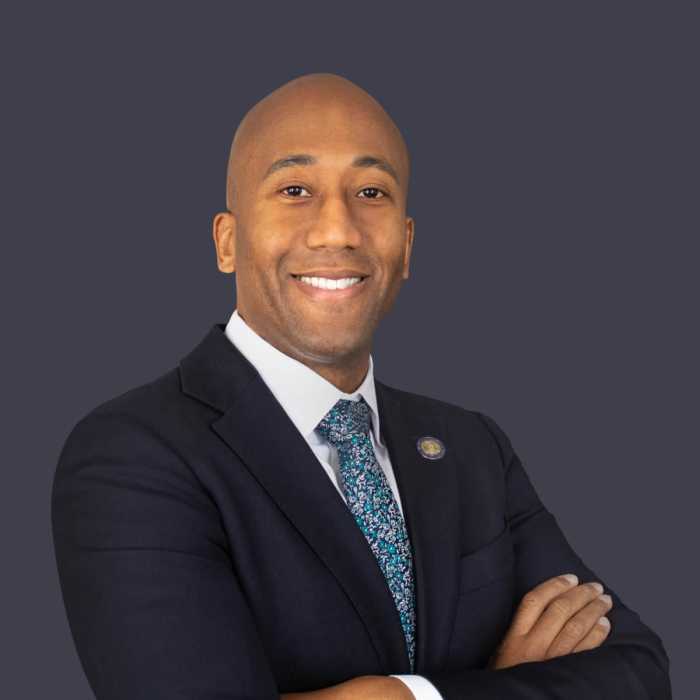Last year’s New York state budget was nine days late, something which Governor Kathy Hochul said Wednesday was the result of her determination to tweak the state’s bail reform laws in 2022.
“I feel very strongly about protecting certain issues. That’s the only reason our budget was late nine days last year,” Hochul told reporters during a March 22 briefing at the State Capitol regarding her public safety priorities in the new budget due April 1. She still has to hammer out the final details of the state’s spending plan with legislative leaders, and once again, the governor is seeking a bail reform tweak that could upend all efforts to get the budget completed on time.
The change this time around, Hochul explained, is her effort to eliminate the “least restrictive standard” for judges in determining whether an arrested defendant qualifies for bail. Rather than merely look at whether a defendant will likely make their next court appearance, the changed standard would empower judges to consider more than the least restrictive standards for those accused of serious and/or repeat offenses — such as prior arrests or violations of orders of protection.
Hochul sees the measure as a “common sense” effort to clear up judicial confusion about bail reform laws and empower jurists to hold more serious offenders behind bars pending trial, without undoing efforts the positive aspects of the bail reform law enacted in 2020.
“It’s common sense, and it will not sacrifice the progress we’ve made in ensuring our overall justice system is more just,” the governor said Wednesday. “I believe it’s the right thing to do, and I look forward to working with the legislature on this change.”
Hochul struck an optimistic tone that the legislature would eventually see things her way regarding the least restrictive standard. But the road looks far from smooth.
On Wednesday afternoon, a group of progressive lawmakers stood alongside criminal justice advocates in Albany urging the legislature to reject new efforts to change the bail reform law. They argued Hochul’s idea would only exacerbate the confusion which the governor hopes to eliminate, and reinstate judicial bias on the bench.
“The Assembly Majority firmly rejected further attempts to water down bail reform in our one-house budget proposal released last week,” said Brooklyn Assembly Member Latrice Walker. “Why try to fix something that study after study shows is working? People are returning to court. And bail reform has not contributed to an increase in crime.”
Queens state Senator Jessica Ramos agreed with Walker and echoed her call for the state to provide greater resources to improve communities rather than change the bail laws.
“Public safety is jobs, housing, and healthcare. If you are honest about wanting public safety, you will declare a war on poverty,” Ramos said. “That is what we are committed to doing: protect bail reform and invest in our communities.”
Hochul pointed out Wednesday that she hopes to add $337 million in this year’s budget to further stop gun violence around New York through a variety of efforts including youth employment programs, prosecutorial aid, street outreach programs and the state’s GIVE (Gun-Involved Violence Elimination) Initiative.
Still, the governor sees this latest bail reform tweak as critical toward helping New York state turn around a 21% increase in overall index crime in 2022. Even though murders and shootings dropped statewide over the last year, she noted, smaller crimes such as auto theft continue to plague police departments and communities all over New York.
A large number of these crimes, Hochul charged, were the result of recidivists, namely individuals accused of committing serious offenses who were let out on bail under the reform laws. The rearrest rates for individuals with five previous collars was up 77% in New York state last year, according to data from the state Department of Criminal Justice Services.
The least restrictive standard reform, the governor explained, targets this “relatively small percentage of people responsible for a disproportionate share of our public safety challenges.”
Asked whether having an on-time budget meant more than obtaining a budget meeting her priorities, Hochul hoped that she’d avoid any budgetary stalemate with the Assembly and state Senate — but she also stands firm in what she’s seeking.
“Everyone would like an on-time budget. I laid out early, in my State of the State, my priorities so there’s no surprises,” she said. “I feel confident we’ll be able to achieve an on-time budget, but if we don’t, it’ll be because there are continuing discussions about matters that I consider extremely important.”



































